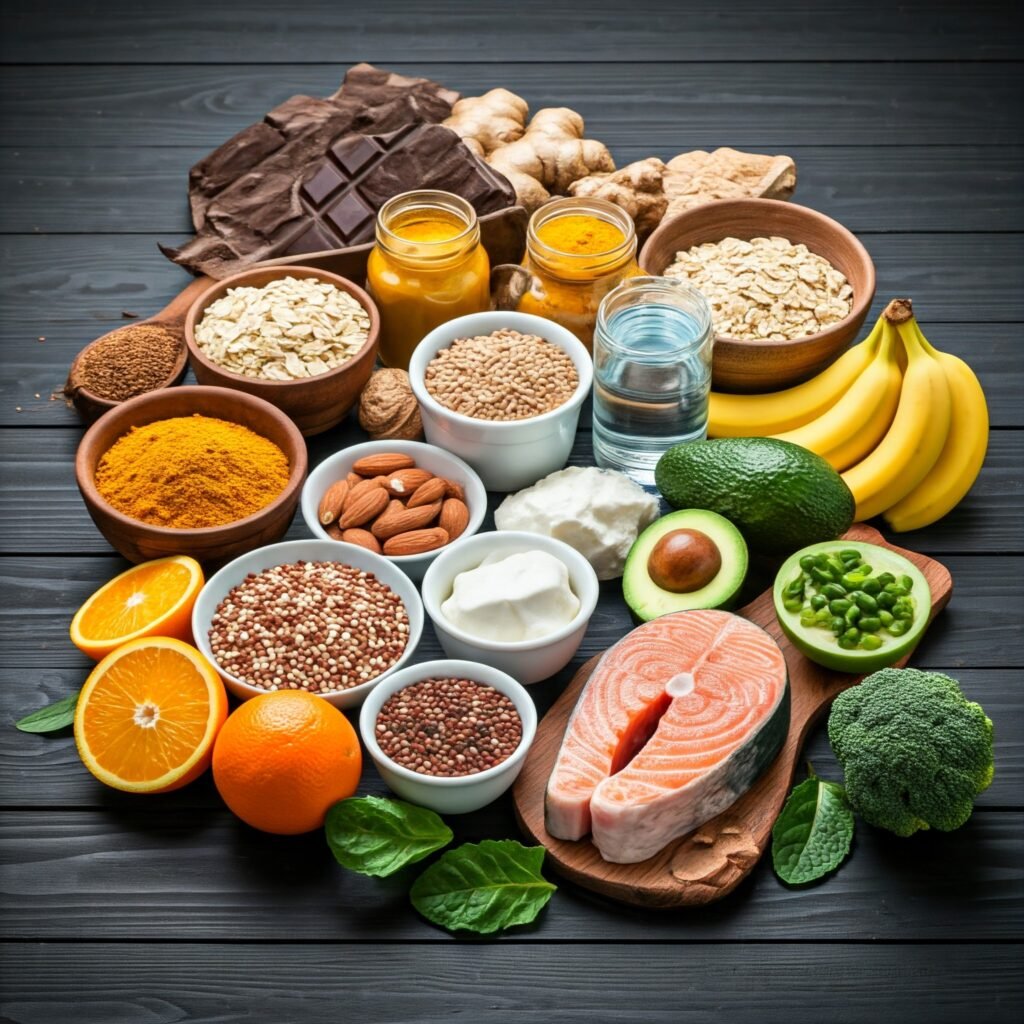Some research suggests that dietary changes may help control periods symptoms. For example periods cramps can be reduced by increasing your intake of fruits and vegetables and drinking plenty of water.

What Eat During Periods
1. Dark Chocolate
Magnesium found in dark chocolate has ability to relax muscles which can help ease pain. Magnesium also reduces headaches that some women experience during periods. Antioxidants specially flavonoids which have anti-inflammatory properties and can reduce pain are also present in dark chocolate. To get most health benefits choose chocolate with high cocoa content 70 percent or more.
2. Ginger
Ginger has strong antioxidant and anti-inflammatory properties. It is reduce pain, inflammation and nausea. Ginger promotes blood circulation which reduces cramps. Ginger may be as effective as nonsteroidal anti-inflammatory drugs in reducing periods pain. Add fresh ginger to soups, smoothies or drink it as tea.
3. Fish (Fatty Fish like Salmon, Mackerel)
Omega-3 fatty acids are lots of in fatty fish and ability to reduce inflammation. Prostaglandins cause pain and inflammation during periods can be produced less when omega-3 fatty acids are present. This reduces periods cramps. Omega-3 fatty acids generally promote hormonal balance. Try to eat two servings or more of fatty fish per week.
4. Lentils
Iron and magnesium lots of in lentils can help reduce fatigue and periods cramps. Iron is required during menstruation because low iron levels from blood loss can lead to fatigue. Magnesium eases muscle tension and reduces severity of cramps. To replenish iron and magnesium add lentils to salads, soups or side dishes.
5. Fruits (Specially Berries and Citrus)
Fruits including apples, oranges and berries are rich in vitamin C and antioxidants. Vitamin C helps reduce inflammation and support immune system. By preventing oxidative stress, antioxidants in fruits like berries can help reduce pain. Fruits also help in digestion and hydration which can help reduce bloating and discomfort during periods. Eat variety of fruits every day and specially those high in vitamin C.
6. Oatmeal
Magnesium helps to relax and relieve constipation is found in oatmeal. Oatmeal helps to reduce bloating. Complex carbohydrates which are found in oatmeal give you sustained energy and help fight fatigue. Eat a cup of oats to help you build muscle and last longer.
7. Turmeric Powder
Curcumin powerful anti-inflammatory found in turmeric may help ease periods discomfort. Curcumin inhibits synthesis of pro-inflammatory cytokines and enzymes to reduce pain and discomfort. Helpful in reducing uterine cramps and inflammation. Use turmeric anti-inflammatory properties in soups, curries and golden milk (warm milk with turmeric).
8. Water
Dehydration can increase cramps and bloating during your periods so it’s important to stay hydrated. By eliminating excess salt drinking enough water can help reduce water retention and bloating. Hydration ensures adequate blood flow which can reduce severity of cramps. Aim to drink eight glasses or more if you are active person.
9. Yogurt
Probiotics found in yogurt support gut health. Healthy digestive system can help reduce periods pain and bloating. Strong immune system and probiotics can also help regulate hormones which some research suggests may reduce PMS symptoms. Choose plain, unsweetened yogurt to get most health benefits without added sugar.
10. German Chamomile
Chamomile soothing and anti-inflammatory properties calming muscles of uterus, reducing discomfort and help reduce periods cramps. Chamomile can help ease pain of periods related sleep disturbances. To ease cramps and promote relaxation sip chamomile tea before bed.
11. Nuts (Almonds, Walnuts)
Magnesium lots of in almonds helps relieve period cramps and soothe muscles. They are also high in vitamin E and good fats which can help reduce inflammation and regulate hormones. Magnesium reduce severity of bloating and cramps. Eat handful of walnuts or almonds as snack or add them to cereals and salads.
12. Avocado
Packed with potassium, magnesium and healthy fats avocados can help ease cramps and relax muscles. They contain vitamin B6 which can help reduce irritability and mood swings that are sometimes associated with PMS. Potassium reduces bloating and stops water retention. Avocados are nutrient-rich food that can be added to smoothies, salads or toast.
13. Bananas
Potassium lots of in bananas helps reduce water retention during periods and avoid muscle cramps. They contain vitamin B6 which can help reduce inflammation and mood swings. Bananas provide you with quick energy and are easy to digest. Bananas can be eaten as snack or added to oatmeal or smoothies.
14. Peppermint
Periods cramps, bloating and intestinal pain decrease by peppermint. Peppermint can help calm body and mind which can help reduce inflammation and mood swings. Drink peppermint tea or breathe peppermint oil for relax.
15. Tofu
Tofu is great plant-based source of iron, magnesium and protein which can help relieve cramps and replenish nutrients lost during periods. It is high in phytoestrogens which are plant-based substances that act similarly to estrogen in body and help maintain hormone balance during menstrual cycle. Add tofu to salads, soups and stir-fries to add protein to your diet.
16. Flaxseed Oil
Omega-3 fatty acids lots of in flaxseed oil have potent anti-inflammatory effects. By reducing body production of prostaglandins these fats help reduce severity of periods cramps. In addition to supporting hormonal balance, omega-3s may reduce PMS symptoms. Drizzle flaxseed oil over salads or add it to smoothies.
17. Iron
During periods iron is required because it helps replace iron lost during blood flow. Low iron levels can cause fatigue and weakness. Iron rich foods can provide you with energy during your period and help prevent anemia. Eat iron rich foods such as spinach, red meat, tofu and lentils. Take iron supplement if necessary.
18. Magnesium
Magnesium reduces intensity of periods cramps and helps with muscle relaxation. It reduces water retention and bloating. During periods magnesium deficiency is common and can lead to muscle fatigue and cramps. To reduce cramps, eat foods rich in magnesium such as leafy greens, legumes, nuts and seeds.
19. Oranges
Vitamin C lots of in oranges helps boost immune system and reduce inflammation during menstruation. Vitamin C can help prevent anemia by facilitating absorption of iron from plant based sources. Natural sugars in oranges provide you with quick energy boost and help fight fatigue. For benefits of vitamin C, consume whole oranges or drink fresh orange juice.
20. Quinoa
Quinoa is good source of magnesium which helps relieve cramps and complete protein. It contains fiber which promotes good digestion and reduces bloating. Quinoa helps to combat menstrual fatigue by providing long lasting energy. Quinoa is nutritious alternative to rice or pasta for base of meal.
21. Red Meat
Heme iron kind of iron that is most readily absorbed is lots of in red meat and is required for restoring iron that is lost during periods. Fatigue and weakness brought on by low iron levels can be avoided or lessened with red meat. Limit your intake of lean red meats like lamb or beef.
22. Vegetables (Specially Leafy Greens)
Iron, calcium and magnesium are lots of in vegetables. Specially leafy greens like spinach, kale and Swiss chard. These nutrients help prevent anemia, reduce cramps and relax muscles. High in fiber, leafy greens can help in digestion and reduce bloating. Add variety of leafy greens to stir-fries, soups and salads.
23. Broccoli
Rich calcium, magnesium and fiber content in broccoli can help reduce bloating and period cramps. Calcium helps ease muscular tension and cramps. Antioxidant properties of broccoli help promote general health. Broccoli can be steamed, roasted or used in salads and stir-fries.
24. Green Leafy Vegetables (Spinach, Kale)
Magnesium, calcium, iron and vitamins found in leafy greens can help ease cramps, promote muscle relaxation and replenish nutrients lost during periods. Magnesium rich vegetables can help reduce bloating and generally increase period comfort. To get most benefit eat variety of leafy greens every day.
